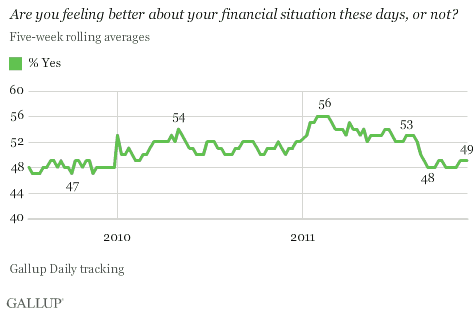PRINCETON, NJ -- Forty-nine percent of Americans are feeling better about their financial situations these days, representing a continuing downturn from the average of 53% who were feeling better in mid-summer. The drop in Americans' positive attitudes about their finances in August occurred just after the congressional wrangling over the Aug. 2 debt ceiling deadline, suggesting that there may be a similarly negative impact from this week's failure of the supercommittee to reach its budget-cutting deadline.

Gallup asks this personal finance question of a random sample of about 850 Americans each week, and the results here represent rolling five-week averages based on more than 3,500 interviews each.
The percentage of Americans who were feeling better about their financial situations rose to a five-week average of 56% in January and February of this year, the highest since the question was first asked in the summer of 2009. The percentage of Americans holding this positive view slipped in the spring, but stabilized at the 52% to 54% level until August, when it fell to 48%, near the all-time low of 47% recorded several times in 2009. This drop began shortly after the congressional debate about raising the debt ceiling before the Aug. 2 deadline.
Americans' broader assessment of the U.S. economy also fell at about this same time. The timing of the drop in these economic measures, coinciding as it did with the debt ceiling debate, suggests that Congress' difficulties in reaching a decision on crucial budget and economic matters had an effect on the way Americans look at their financial situations.
Americans this week are hearing news reports that their elected representatives have failed to reach an agreement on cutting $1.2 trillion from the federal budget. Any possible impact of this on Americans' views of their personal financial situations will become evident in the weeks ahead.
Implications
Gallup Daily tracking data show that Americans became more negative about their personal finances last August, just after Congress was wrangling over the federal budget deficit and barely managing to reach a last-minute agreement on postponing steps to cut the deficit.
Now it has become apparent that the August postponement simply delayed the indecision, as the congressional supercommittee appointed to reach an agreement on cuts by this week has failed to do so, leaving the American public to face once again the prospect of a Congress unable to agree on important elements on its agenda.
Retailers are hoping for a robust holiday shopping season this year -- a season that traditionally begins with this week's day-after-Thanksgiving "Black Friday" sales. Gallup's November estimate of Christmas spending also points to an improvement in holiday sales compared with last year. If the supercommittee's lack of action negatively affects consumer attitudes and then consumer spending, that would certainly be an unwelcome holiday present for retailers.
But a Gallup poll conducted Monday night, just after the supercommittee announced its failure to reach an agreement, showed that many Americans have not been paying close attention to these events, and that relatively few Americans express strong levels of worry about their impact on the economy. Thus, it is possible that the situation in Washington will not have a significant impact on Americans' attitudes and, ultimately, on their spending -- although it will be several weeks before any possible impact can be ascertained.
Americans' approval of the job Congress is doing is already at historical lows, so it is also possible that they have factored any impact of the congressional supercommittee's failure to trim the deficit into their feelings about their personal finances by this point.
Survey Methods
The results reported in this analysis are based on telephone interviews conducted as part of the Gallup Daily tracking survey, reported in five-week rolling averages beginning with the period spanning June 8-July 12, 2009, and ending with the period spanning Oct. 17-Nov. 20, 2011. Each five-week rolling average is based on a random sample of approximately 3,500 adults, aged 18 and older, living in all 50 U.S. states and the District of Columbia.
For results based on the total sample of national adults, one can say with 95% confidence that the maximum margin of sampling error is ±2 percentage points.
Interviews are conducted with respondents on landline telephones and cellular phones, with interviews conducted in Spanish for respondents who are primarily Spanish-speaking. Each sample includes a minimum quota of 400 cell phone respondents and 600 landline respondents per 1,000 national adults, with additional minimum quotas among landline respondents by region. Landline telephone numbers are chosen at random among listed telephone numbers. Cell phone numbers are selected using random-digit-dial methods. Landline respondents are chosen at random within each household on the basis of which member had the most recent birthday.
Samples are weighted by gender, age, race, Hispanic ethnicity, education, region, adults in the household, and phone status (cell phone only/landline only/both, cell phone mostly, and having an unlisted landline number). Demographic weighting targets are based on the March 2010 Current Population Survey figures for the aged 18 and older non-institutionalized population living in U.S. telephone households. All reported margins of sampling error include the computed design effects for weighting and sample design.
In addition to sampling error, question wording and practical difficulties in conducting surveys can introduce error or bias into the findings of public opinion polls.
For more details on Gallup's polling methodology, visit www.gallup.com.
